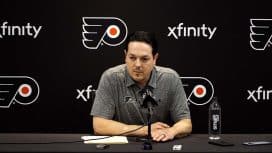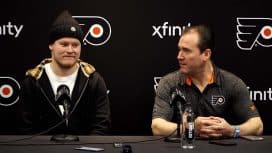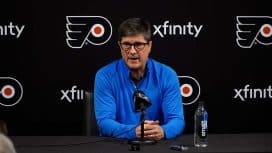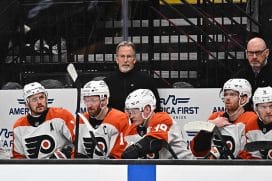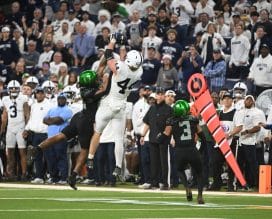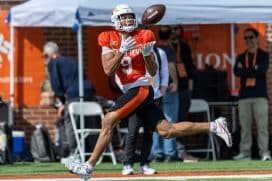Flyers
What Makes Alain Vigneault the Perfect Coach for Philadelphia
By Jeff Quake, Sports Talk Philly staff writer
Looking back in hindsight makes everything easier, whether it’s decisions made by a GM, coach, or owner. After the Philadelphia Flyers fired head coach Dave Hakstol on December 17, 2018, they waited until after the season to announce the next head coach of the team. On April 15, 2019, the Flyers announced the hiring of Alain Vigneault as the 21 coach in franchise history.
Leading up to the decision made in April, it was long rumored that the Flyers were interested in hiring another coach with quite the track record, Joel Quenneville. Instead, Quenneville chose to join the Florida Panthers. Vigneault was the best option available as the Flyers conducted their search for a new head coach, and it's proving to work out rather well for both sides.
With the season suspended currently, “AV” has led the Flyers to a 41-21-7 record in his first year as head coach in Philadelphia. While the chances of resuming the season remain unknown, it is the best season the organization has had since 2017-18, when they went 42-26-14 with Hakstol as their head coach.
Vigneault is a better fit in Philadelphia than he was in New York with the Rangers. His offensive system did not fit in New York — despite going to the Stanley Cup Final in 2014, his first season with the Blue Shirts. The ironic part is that Vigneault has coached in both the Eastern Conference and Western Conference using the same exact system, working practically every year.
With the Montreal Canadians, the then 36-year-old rookie head coach started a four-year tenure. During that time, from 1997 to 2001, Vigneault went 109-118-35 in 266 games coached. Despite only making the playoffs once in four years, Vigneault started off with a solid impression in the NHL. He then found his way in Canada five years later, which turned out to be the best decision of his life.
During his seven years with the Vancouver Canucks, Vigneault went 313-170-57 in 540 games, winning the Jack Adams Award in 2007 and leading the Canucks to a President's Trophy in the 2010-11 and 2011-12 seasons. He also reached the Stanley Cup Final with the Canucks in 2011. Six out of the seven years, Vigneault not only led the Canucks to the playoffs, but won the Pacific Division all six times as well.
That then led him to the Rangers where he coached for five seasons from 2013 to 2018 with another great start. In just his first season in New York, he led the Rangers to the Stanley Cup Final, followed by a President’s Trophy winning season in 2014-15. Overall, he coached his way to playoff berths in four out of the five seasons, but the final three with results that were not exactly what he was looking for. Although there were some encouraging moments with the Rangers, a few rumors began to form surrounding their head coach, including that he didn't work well, or help develop his younger players such as Filip Chytil and Lias Andersson. Vigneault favored veterans like Tanner Glass and Cody McLeod. He also seemed to bench the wrong players, which didn't go over well with the team or their fans.
After his dismissal from the Rangers, Vigneault took a year off from coaching in the NHL, where he then landed in Philadelphia using the same offensive style, and succeeding thus far in the City of Brotherly Love. Vigneault has been a fan favorite so far in Philadelphia, and got a thunderous applause when announced during the Flyers home opener against the New Jersey Devils back in October after many got a closer look at the coach's way of working and his personality in the Behind the Glass series on NHL Network.
The idea behind Vigneault's offensive system is that all four lines make an impact during the game both physically and mentally. He makes sure his players are in the right position in the opponent’s zone, all while crashing the net, constantly and aggressively forechecking the opposition. Even from time to time, you might see Vigneault send a defenseman in to pinch and join the rush or the scramble out in front of the net.
The difference between Vigneault and Hakstol is that Vigneault knows the best times to deploy this system of pinching and when to have players fall back. Under Hakstol, there was often times too aggressive a strategy on pinching defensemen, which consistently led to players getting caught in the offensive zone and left for dead while getting outskated by the opposition.
Now that doesn’t mean players don’t get caught still while pinching, especially some rookie players. Those rookie mistakes happen from time to time. But with Hakstol no longer behind the bench, it hasn't happened in a majority of games for the Flyers this season. That is also another reason why GM Chuck Fletcher deserves plenty of credit for acquiring veteran defensemen Matt Niskanen, and Justin Braun to help in those situations.
Speaking of veteran players, Vigneault has done a great job putting players on the right lines, including his younger players. That may also be because of the team's age. The average age for Philadelphia's forwards is 27.6, even with veterans like Nate Thompson — the recently-acquired 35-year-old — in the lineup. Vigneault has given some reasonable minutes to the Flyers younger players, notably Travis Konecny, Sean Couturier, Nicholas Aube-Kubel and Scott Laughton on offense. On the blue line, he has Ivan Provorov, Robert Hagg, Travis Sanheim, Shayne Gostisbehere and Phil Myers, who are all 27 or younger. Even as younger players with limited experience in the NHL, these players are placed in key roles in this system for Vigneault, and are the difference-makers in making this a successful season so far.
The IQ for Philadelphia’s team and head coach is off the charts, and it certainly shows every game and practice. They play with more skill, and the ability to think quickly on the ice — as this isn’t the fastest Flyers team — is because they are so prepared. They don’t have to be the fastest on the ice. Their skill and high hockey IQ get the job done, day in and day out.
By the end of the day, as much as it would have been nice to have Coach Q behind the bench for the Flyers, it is AV’s system, personality and much more that makes this team fun to watch and why he will lead them to the playoffs — hopefully this year if the season can resume. It will give him yet another chance to get the ending he and Flyers fans everywhere have long been waiting for, the opportunity to claim the Stanley Cup.
